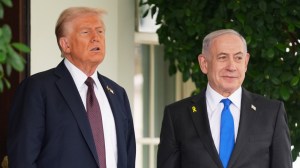Yahoo’s new partner, Jack Ma of Alibaba, is a master at selling
Everything you hear about Jack Ma is improbable. But today, he looks like one of China’s smartest high-tech entrepreneurs. Yahoo’s...

Everything you hear about Jack Ma is improbable. But today, he looks like one of China’s smartest high-tech entrepreneurs. Yahoo’s far-reaching deal with him last Thursday has turned his company, Alibaba.com, into the largest online operation in China, where Internet use is growing at an explosive pace.
At a time when Microsoft, Google and eBay are seeking to expand their operations in China, Yahoo agreed to the largest Internet investment ever made here when it bet $1.7 billion on the future of Alibaba.com and its founder, Ma.
Jack Ma is only 40, and he started out teaching English. But he is now called the “grandfather of the Internet in China,” even though he claims not to know much more about computers than how to send and receive e-mail.
His admirers and detractors both call him a clever salesman and savvy marketer who knows how to attract foreign money. But few expected him to pull off a deal that now values his company at more than $4 billion.
Yahoo had said it would invest $1 billion in the privately held Alibaba.com, which operates not only its namesake, a business-to-business auction site that mostly purveys Chinese goods to a worldwide market, but also the consumer auction site Taobao.com, a strong rival here to eBay.
In exchange for a 40 per cent stake in Alibaba, Yahoo also agreed to hand over control of its Yahoo China operations, valued at $700 million, putting great confidence in Ma and his management team.
Some bankers say it was a brilliant stroke by Ma, playing off eBay against Yahoo. Both had pursued Alibaba in recent months, according to bankers involved in the Yahoo deal.
And over the years, this wiry, roughly five-foot-tall man with a big, cheeky smile, has surprised doubters again and again. “He’s a visionary,” says Mark Su, who works in San Francisco for the venture capital firm H&Q Asia Pacific. “He’s been there at the forefront of a lot of trends in the Internet.”
Ma has a penchant for clever puns, gimmicky marketing and brash talk. He does not hesitate to declare that his company will crush competitors like eBay.
And his critics have fought back by suggesting that Alibaba, which had about $46 million in revenue last year, is more marketing pizazz than substance. “It looks like vapour,” says Merle Hinrichs, chairman of Global Sources, a Hong Kong-based competitor to Alibaba in the business-to-business market. “Their numbers from our perspective are exaggerated.”
Regardless, Ma is now one of China’s most powerful chief executives. And he did not need an initial public offering to accomplish that. He has in turn persuaded Goldman Sachs, the Japanese investment firm Softbank and now Yahoo to finance a company he founded in his apartment in 1999, helping transform it into a diversified Web conglomerate that offers email, search functions and electronic payment services along with auctions.
At Alibaba’s headquarters in Hangzhou, south of Shanghai, Mr. Ma spoke in fluent English on Saturday about how he came to win over Westerners, and Yahoo. “A lot of people don’t understand Alibaba,” he said. “In the U.S., B-to-B companies died because they focused on big companies. We’re focusing on small and medium-sized companies. We’re helping them make money.” — NYT





- 01
- 02
- 03
- 04
- 05


























